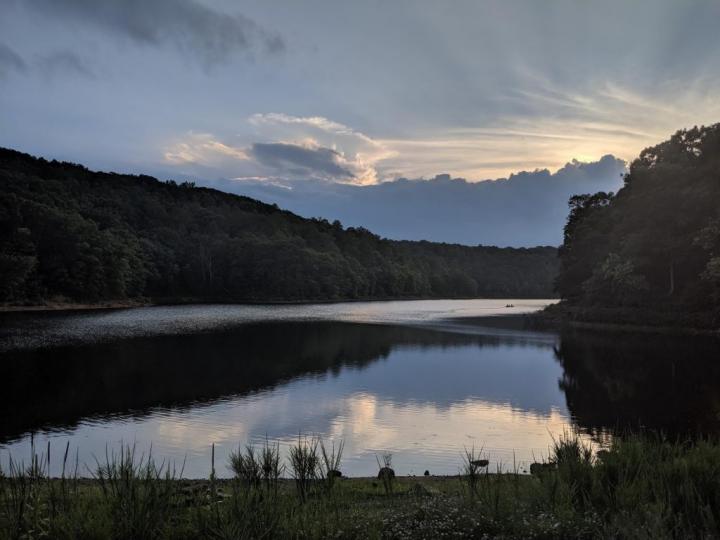
Credit: Alexandria Hounshell
Because of land use and climate change, lakes and reservoirs globally are seeing large decreases in oxygen concentrations in their bottom waters. It is well-documented that low oxygen levels have detrimental effects on fish and water quality, but little is known about how these conditions will affect the concentration of carbon dioxide and methane in freshwaters.
Carbon dioxide and methane are the primary forms of carbon that can be found in the Earth’s atmosphere. Both of these gases are partially responsible for the greenhouse effect, a process that increases global air temperatures. Methane is 34 times more potent of a greenhouse gas than carbon dioxide, so knowing how low oxygen levels within lakes and reservoirs affect both carbon dioxide and methane could have important implications for global warming.
Until now, researchers did not have any empirical data from the whole-ecosystem scale to definitively say how changing oxygen can affect these two greenhouse gases.
“We found that low oxygen levels increased methane concentrations by 15 to 800 times at the whole-ecosystem scale,” said Alexandria Hounshell, a postdoctoral researcher in the Department of Biological Sciences in the College of Science. “Our work shows that low oxygen levels in the bottom waters of lakes and reservoirs will likely increase the global warming potential of these ecosystems by about an order of magnitude.”
Virginia Tech researchers just published these findings in a high-impact paper in Limnology and Oceanography Letters.
To determine a correlation between oxygen and methane concentrations, researchers honed in on two reservoirs outside of Roanoke. In collaboration with the Western Virginia Water Authority, the research team operated an oxygenation system in Falling Creek Reservoir, which pumps oxygen into the bottom waters and allows researchers to study oxygen concentrations on a whole-ecosystem scale. By also monitoring Beaverdam Reservoir, an upstream reservoir without an oxygenation system, they were able to compare greenhouse gas concentrations in the bottom waters of both reservoirs. They ran the experiment over three years to see how consistent their findings were over time.
“Methane levels were much higher when there was no oxygen in the bottom waters of these reservoirs; whereas the carbon dioxide levels were the same, regardless of oxygen levels,” said Cayelan Carey, associate professor of biological sciences and affiliated faculty member of the Global Change Center. “With low oxygen levels, our work shows that you’ll get higher production of methane, which leads to more global warming in the future.”
This study was one of the first to experimentally test at the whole ecosystem-scale how different oxygen levels affect greenhouse gases. Logistically, it is extremely challenging to manipulate entire ecosystems due to their complexity and many moving parts. Even though scientists can use computer modelling and lab experiments, nothing is as definitive as the real thing.
“We were able to do a substitution of space for time because we have these two reservoirs that we can manipulate and contrast with one another to see what the future may look like, as lower bottom water oxygen levels become more common. We can say with high certainty that we are going to see these lakes become bigger methane emitters as oxygen levels decrease,” said Carey.
According to Hounshell, the strength of their results lie in the study’s expanse over multiple years. Despite having a range of meteorological conditions over the three years, the study affirmed that much higher methane concentrations in low oxygen conditions happen consistently every year, no matter the air temperature.
Ultimately, this study is crucial for how researchers, and the general public, think about how freshwater ecosystems produce greenhouse gases in the future. With low oxygen concentrations increasing in lakes and reservoirs across the world, these ecosystems will produce higher concentrations of methane in the future, leading to more global warming.
Of course, these ecological changes are not just happening in the Roanoke region. Around the globe, a number of studies have pointed to changing carbon cycling in terrestrial and marine ecosystems. However, this study is one of the few to address this phenomenon in lakes and reservoirs, which are often neglected in carbon budgets. This study will fill in these knowledge gaps and shine a spotlight on what we can do as citizens to solve this problem.
This study suggests that keeping lakes from experiencing low oxygen concentrations in the first place could further prevent them from hitting the tipping point, when they start to become large methane producers. Small decisions can add up. For example, decreasing runoff into lakes and reservoirs can prevent the depletion of oxygen in their bottom waters. “Don’t put a ton of fertilizer on your lawn, and be really strategic about how much fertilizer you use and how you use it,” said Hounshell.
And greenhouse gases are just a small part of the bigger picture of how reservoirs function in the global carbon cycle. Currently, the research team is conducting follow-up oxygen manipulation studies to elucidate other components that contribute to ecosystem change. They will continue to monitor oxygen manipulations in the two Roanoke reservoirs to see how the reservoir can affect the ecosystem for the long haul.
###
This project was funded by the Virginia Tech Institute for Critical Technology and Applied Science, the Fralin Life Sciences Institute at Virginia Tech, and by National Science Foundation grant DEB-1753639.
Media Contact
Kristin Rose Jutras
[email protected]
Original Source
https:/
https://scienmag.com/low-oxygen-levels-in-lakes-and-reservoirs-may-accelerate-global-change/




